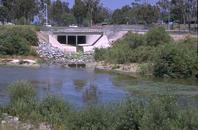|
UC IPM Home > Homes, Gardens, Landscapes, and Turf > Quick Tips > Keep Our Water Clean
Pests in Gardens and Landscapes: Quick Tips
Keep Our Water Clean
 
|
 rotect waterways and landscapes from pesticide runoff.  Runoff from landscape irrigation can carry pesticides and other garden chemicals on to hard surfaces and into storm drains, which lead to our waterways. Home and garden pesticides and fertilizers are polluting California's waterways. Problems occur when people dispose of garden chemicals incorrectly, such as pouring them down drains or washing them into gutters, storm drains, and streams. Chemicals can move into waterways after an application by rain, watering, or cleaning up with a garden hose. Garden chemicals not only threaten aquatic life; they can also affect the quality of our drinking water.
What can you do to protect water quality?
- Limit pesticide use by using nonchemical methods or least-toxic pesticides wherever possible.
- Avoid using pyrethroid insecticides. Products with the active ingredients bifenthrin, cypermethrin, permethrin, and others are among the most toxic to aquatic animals.
- Control ants by reducing food sources, excluding them from homes, and using baits in containers, instead of spraying. Don't use insecticides for lawn insects unless you are sure insects are causing the damage.
- Cut back on fertilizer, more is not better. Actively growing turf, flowering shrubs, and some annuals and fruit trees require regular feeding, but ornamental trees don’t.
- Use slow-release fertilizers, including composted organic fertilizers, which are less likely to move into water. Be sure to measure and apply them according to label directions.
- Don't let fertilizer or pesticides get onto hard surfaces such as sidewalks or driveways. Sweep any material that accidentally lands on hard surfaces back onto the lawn or landscape.
- Dispose of garden chemicals correctly. Never sweep, hose off, or pour leftover pesticides or fertilizers into drains or gutters. Dispose of unused products at your local household hazardous waste site.
Call 1-800-CLEANUP (1-800-253-2687) or go to earth911.com for a disposal site near you!
Reduce runoff by making your landscape water efficient
- Cut down your landscape’s need for water by choosing water-efficient plants and garden designs.
- Reduce runoff by using mulches in beds and permeable materials for walkways and driveways. Aerate and add organic matter such as compost to heavy or compacted soils. Install terraces or other features on slopes to keep water on site.
- Check and maintain your irrigation system so water doesn’t run off your landscape onto hard surfaces and into gutters.
- Improve watering efficiency and distribution by using equipment such as drip irrigation, soaker hoses, and “smart” irrigation controllers and rotor heads.
Minimize the use of pesticides that pollute our waterways. Use nonchemical alternatives or less toxic pesticide products whenever possible. Read product labels carefully and follow instructions on proper use, storage, and disposal.
|



